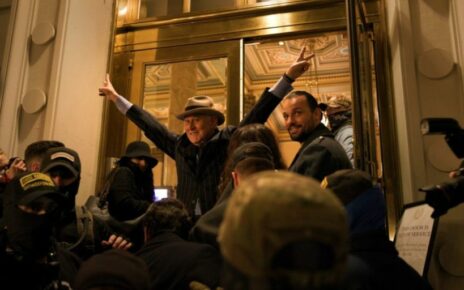Composer Bear McCreary has scored some of the seminal sci-fi and fantasy series of our time, from “Battlestar Galactica” to “The Walking Dead” and “Outlander,” but it’s safe to say that nothing quite compares to his experience scoring “The Lord of the Rings: The Rings of Power,” which debuts Sept. 2 on Prime Video.
The soundtrack album is being released by Amazon Studios Friday on all streaming services, including McCreary’s Season 1 score and the new main title theme by Howard Shore, who won three Academy Awards for his music for the original “Lord of the Rings” feature-film trilogy and scored the later “Hobbit” trilogy as well.
“I’m a huge fan of the J.R.R. Tolkien books, of the legendarium, the mythology and the Peter Jackson films,” McCreary tells Variety. “They were, in a way, at the nexus of my childhood and adulthood, the last films that took me away as a child. I watched those films over and over and over.”
McCreary’s journey with the characters of Middle-earth began 13 months ago, and the secrecy of the project was such that he couldn’t tell anyone, outside of his music team, that he was doing it.
“I’m trying to honor the legacy of what Howard Shore created, and to do so by using those epic colors, and crafting 15 new themes that can be added to the pantheon of memorable melodies that started with Shore’s films,” he says.
He spent two months just writing themes, based primarily on reading the scripts. “Each of the themes had an A section, a B section, an intro, a development,” he explains. “It was like writing a symphony. I planned all this out so that when I could dive into the footage, I would have the pieces I needed in place.”
The music for each of the eight episodes was recorded in London for four days, often with 90-piece orchestras; plus a 40-voice choir in Vienna, singing in various Tolkien-created languages; and soloists across Europe and in Los Angeles, playing hardanger fiddle, nyckelharpa, bagpipes, bodhrán drums and other world-music instruments.
“That means whether you are seeing a giant battle, an epic montage, or just two Harfoots sitting in the woods talking, you have the largest orchestra that could fit in Abbey Road or AIR studios supporting them, along with the best soloists in the world and a huge choir,” McCreary says.
The choral material was carefully prepared. “Every cue with text is either drawn from the books or crafted in close consultation with our language experts,” the composer says. “The context of what is being said, and the language in which it is being said, matches what you are watching. There is a lot of choir. It is not an ingredient. It’s not frosting, it’s the cake.”
The texts are in two Elvish languages, Sindarin and Quenya; the Dwarvish language Khuzdûl; Black Speech, the language of Sauron, creator of the rings; and Adûnaic, the language of the people of Númenor.
McCreary composed nine hours of music in eight months, working long hours with just five days off in that time. “It just does not sound like a television movie,” he says. “It is the most ambitious thing that I’ve ever been attached to. It’s a once-in-a-lifetime opportunity, to be able to pour myself into something so profoundly, and be given the space and the creative freedom to do the score I want to hear.”
Shore’s theme was actually written apart from the McCreary score. “His title is majestic and beautiful. It forms this very inviting fanfare to take us into the world of Middle-earth,” McCreary says.
“The Rings of Power,” however, takes place thousands of years before “The Hobbit” and “The Lord of the Rings” trilogy. “There is a sadness, a wistfulness and a melancholy that is spread across almost all of Shore’s music on those films,” McCreary notes.
“In our show, we are seeing these societies at their peak. So, yes, there’s a connection, but it doesn’t sound the same. In the ‘Hobbit’ films, the dwarfs were a people in diaspora, lost and hoping to retrieve their homeland. Here we see the might of Khazad-dûm, one of the mightiest cities in all of Tolkien’s work, and we see it at its peak. It has this churning industrial energy. It is not sad and forlorn, it’s powerful.
“My hope is that if anyone watches our show and then watches the Peter Jackson films, there will be a continuity of concept,” he says.
McCreary was in his Los Angeles studio writing while most of the music was being recorded overseas. But he did get to conduct the final episode at AIR in April. “For the first time in two and a half years, I got to conduct. It was an amazing experience.”
The album includes two performances by “The Rings of Power” actors: Sophia Nomvete (Princess Disa) on the track “A Plea to the Rocks,” and Megan Richards (Poppy Proudfellow) on “This Wandering Day.”
The album track listing is below, which hints at details in the series:
1) “The Lord of the Rings: The Rings of Power Main Title” (by Howard Shore)
2) “Galadriel”
3) “Khazad-dûm”
4) “Nori Brandyfoot”
5) “The Stranger”
6) “Númenor”
7) “Sauron”
8) “Valinor”
9) “In the Beginning”
10) “Elrond Half-Elven”
11) “Durin IV”
12) “Harfoot Life”
13) “Bronwyn and Arondir”
14) “Halbrand”
15) “The Boat”
16) “Sundering Seas”
17) “Nobody Goes Off Trail”
18) “Elendil and Isildur”
19) “White Leaves”
20) “The Secrets of the Mountain”
21) “Nolwa Mahtar”
22) “Nampat”
23) “A Plea to the Rocks” (feat. Sophia Nomvete)
24) “This Wandering Day” (feat. Megan Richards)
25) “Scherzo for Violin and Swords”
26) “Sailing into Dawn”
27) “Find the Light” (Amazon Music Exclusive)
28) “For the Southlands”
29) “Cavalry”
30) “The Promised King” (Amazon Music Exclusive)
31) “Water and Flame”
32) “In the Mines”
33) “The Veil of Smoke”
34) “The Mystics”
35) “Perilous Whisperings”
36) “The Broken Line”
37) “Wise One”
38) “True Creation Requires Sacrifice”
39) “Where the Shadows Lie” (Instrumental)
Read More About:
Source: Read Full Article

